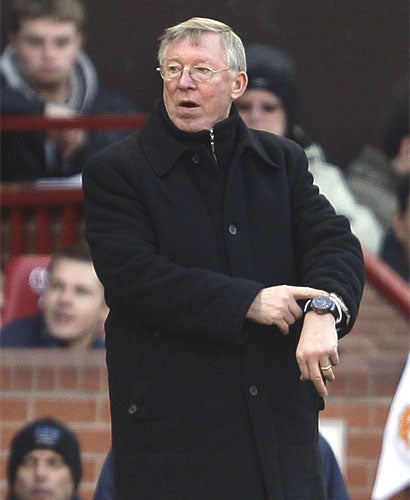Tim Rich: Ferguson feels the heat – but he's been here before
Crucial games with Manchester City, Arsenal and Milan offer no easy way for United to get back on track. Just don't write them off

It was long gone midnight at Lisbon Airport as the aircraft chartered by Manchester United trundled down the runway. Sir Alex Ferguson, as he usually did, sat in the front. In the back were the journalists and most believed this was the last flight they would take with him.
One ordered champagne, which provoked something of an inquiry at Old Trafford. But the man from The Sun always ordered a glass of champagne on the return flight whether United won, lost or drew and for the reasons most of us would when it is free. He would miss him, we would miss him. But it was the end.
It was December 2005. Several hours earlier, in the Stadium of Light, Benfica, a club that always seems to be linked with Manchester United, had eliminated them from the Champions League. For the first time since 1994 they had failed to reach the knock-out stages and had finished last in their group. They were a dozen points adrift of Chelsea and under a new ownership determined to squeeze every drop of revenue from the club. Roy Keane, Ferguson's great lieutenant, had departed amid clouds of acrimony. David Beckham was long gone. Ryan Giggs, temporarily as it turned out, was fading. Everyone at Old Trafford knew he should never have sold Jaap Stam.
In the Sunday Times, Hugh McIlvanney, the man who had co-written his autobiography – ghosted is not the word – suggested that Ferguson should engineer his own departure rather than be "fired by remote control from Florida".
However, he had one card to play. Not a very good card, admittedly, but Manchester United were still in the Carling Cup and it was suddenly important. When it came to the semi-final, against a Blackburn Rovers side managed by Mark Hughes – whom he should have faced in this year's semi-final had the Welshman kept his job at Manchester City – there was no question of playing the kids.
The line-up for the first leg at Ewood Park was: Van der Sar, Neville, Brown, Ferdinand, Silvestre, Ronaldo, Fletcher, Smith, Giggs, Rooney and Saha. In one of those displays of ruthlessness that has kept him alive for 36 years in football management, he had already decided to dump Ruud van Nistelrooy. He and Cristiano Ronaldo detested each other and Ferguson decided, with a brilliant intuition, to back the younger man.
When they won the Carling Cup, with a 4-0 demolition of Wigan Athletic at the Millennium Stadium, Ferguson paraded it as if it were the European Cup and that, after perhaps the most astonishing revival of his career, was precisely what, two years later, he was holding in Moscow.
Now, after the sting of defeat by Leeds United in the FA Cup, the Carling Cup is suddenly important again at Old Trafford and not just because the semi-final opponents are Manchester City. United are two points, not 12, behind Chelsea and the final match of their Champions League group was to overcome Wolfsburg, the Bundesliga champions, on their own pitch, with Michael Carrick and Darren Fletcher playing in central defence.
They had qualified for the knock-out stages two games earlier. But they have lost seven times already this season, there are plans to further refinance a debt bigger than anything that sank Leeds, and Ferguson is adamant there will be no reinforcements in January. No one is really sure when Rio Ferdinand or Owen Hargreaves, perhaps the club's two most naturally intelligent footballers, will play again. Ferguson's greatest successes have been achieved with a great goalkeeper and should Edwin van der Sar, who is every bit Peter Schmeichel's equal, retire to spend more time with his young family in the Netherlands, his replacements from within are good rather than great.
Speaking after the defeat by Leeds, Lou Macari, United's great attacking midfielder of the Tommy Docherty years, summed up the products of the club's youth policy by concluding that, however promising they might be, they had yet to achieve anything and there was certainly no Giggs or Scholes among them.
The semi-final with Manchester City is one of three meetings in the next two months that will determine United's immediate future, along with the Premier League encounter with Arsenal, who suddenly seem everybody's best bet for the long term, and in the Champions League there is Milan and David Beckham.
In 2006 Ferguson had the brilliance of Ronaldo that altered every calculation. In Wayne Rooney he has another undisputed world-class footballer. In 1972, when Manchester United faced decline and relegation, George Best approached Sir Matt Busby, then the power behind the throne, and asked to be made captain and have a side built around him. Busby refused.
Ferguson has toyed with and rejected the idea of the boy from Croxteth wearing the armband for personal and tactical reasons but he is a man around whom footballers of the quality of Jonny Evans, Darren Fletcher and the Da Silva twins could gel and, if they do, who knows what piece of silverware the old fox might be holding in two years' time? It might be a carriage clock, it might just be a European Cup.
Coming up for United
9 Jan Birmingham (PL) Away
16 Jan Burnley (PL) Home
19 Jan Manchester City (LC) A
TBC 23/24 January Hull City (PL) H
27 Jan Manchester City (LC) H
31 Jan Arsenal (PL) A
Subscribe to Independent Premium to bookmark this article
Want to bookmark your favourite articles and stories to read or reference later? Start your Independent Premium subscription today.

Join our commenting forum
Join thought-provoking conversations, follow other Independent readers and see their replies